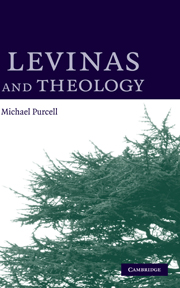Book contents
- Frontmatter
- Contents
- List of abbreviations of Levinas' works
- Introduction
- 1 Levinas, phenomenology, and theology
- 2 Ethics, theology, and the question of God
- 3 Incarnate existence
- 4 Existence as transcendence, or the call of the infinite: towards a theology of grace
- 5 The economy and language of grace: grace, desire, and the awakening of the subject
- 6 The liturgical orientation of the self
- 7 Eucharistic responsibility and working for justice
- Notes
- Select bibliography
- Index
1 - Levinas, phenomenology, and theology
Published online by Cambridge University Press: 08 January 2010
- Frontmatter
- Contents
- List of abbreviations of Levinas' works
- Introduction
- 1 Levinas, phenomenology, and theology
- 2 Ethics, theology, and the question of God
- 3 Incarnate existence
- 4 Existence as transcendence, or the call of the infinite: towards a theology of grace
- 5 The economy and language of grace: grace, desire, and the awakening of the subject
- 6 The liturgical orientation of the self
- 7 Eucharistic responsibility and working for justice
- Notes
- Select bibliography
- Index
Summary
Emmanuel Levinas first became prominent in the French philosophical environment as a translator and commentator of Edmund Husserl (1859–1938), and was largely responsible for introducing phenomenology to France.
Following studies in Strasbourg where he obtained his licence in 1927, he embarked on doctoral studies on Husserl, and in the academic session of 1928–29 went to Freiburg-im-Breisgau where he attended classes given by Husserl and Heidegger. His doctoral thesis, subsequently published in 1930, took as its theme ‘The Theory of Intuition in Husserl's Phenomenology’. Husserl, meanwhile, had delivered a series of lectures in Paris in 1929. These, first published in French in 1931 as Méditations Cartésiennes in extended form, were translated and co-edited by Levinas, and became influential in the development of French phenomenological thought. Significantly, it was the translation of the fifth of the Cartesian Meditations which fell to Levinas that accounts for Levinas' ongoing interest in pursuing the intersubjective reduction in phenomenology, implicated but not pursued by Husserl.
Simone de Beauvoir, in La Force de l'âge, gives a somewhat amusing account of this influence of Levinas on phenomenology in France, when she recounts Sartre's first encounter with phenomenology. Out with Raymond Aron, a student of Husserl, in Paris in 1932, apricot cocktails were ordered. According to de Beauvoir, Aron said to Sartre, ‘You see, my little comrade, if you are a phenomenologist, you can talk about this cocktail, and that is philosophy.’
- Type
- Chapter
- Information
- Levinas and Theology , pp. 7 - 44Publisher: Cambridge University PressPrint publication year: 2006



